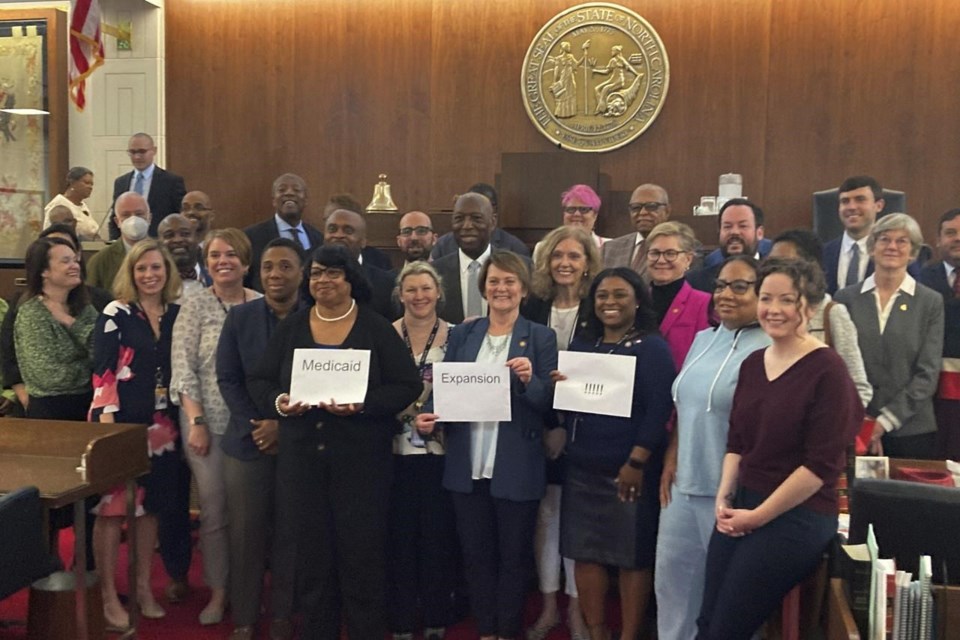RALEIGH, N.C. (AP) — A Medicaid expansion deal in North Carolina received final legislative approval on Thursday, capping a decade of debate over whether the closely politically divided state should accept the federal government's coverage for hundreds of thousands of low-income adults.
North Carolina is among states with Republican leaders that are considering expanding Medicaid after years of steadfast opposition. Voters in South Dakota approved expansion in a referendum in November. And in Alabama, advocates are urging lawmakers to take advantage of federal incentives to expand Medicaid in order to provide health insurance to more working people.
When Democratic Gov. Roy Cooper, a longtime expansion advocate, signs the bill, it should leave 10 states in the U.S. that haven't adopted expansion. North Carolina has 2.9 million enrollees in traditional Medicaid coverage. Advocates have estimated that expansion could help 600,000 adults.
“Medicaid Expansion is a once in a generation investment that will make all North Carolina families healthier while strengthening our economy, and I look forward to signing this legislation soon,” Cooper tweeted.
There’s no set start date in the final bill for expansion under the legislation, but it still comes with one caveat: It can’t happen until after a state budget is approved. This usually happens in the early summer. Cooper panned that provision, which could give GOP leaders leverage to include unrelated items he may strongly oppose.
The House voted 87-24 in favor of the deal, after little debate and a preliminary vote on Wednesday. Many Democratic members on the floor stood and clapped after it passed, which is usually not permitted under chamber rules. Almost two-thirds of the House Republicans also voted yes. The Senate already approved the legislation last week in near-unanimous votes.
The final agreement also included provisions scaling back or eliminating regulations that require state health officials to sign off before medical providers open certain new beds or use equipment. Senate Republicans demanded the “certificate of need” changes in any deal.
Republicans in charge of the General Assembly for years had been skeptical about expansion, which originated from the federal Affordable Care Act signed into law by President Barack Obama 13 years ago Thursday.
GOP legislators passed a law in 2013 specifically preventing a governor's administration from seeking expansion without express approval by the General Assembly. But interest in expansion grew over the past year as lawmakers concluded that Congress was neither likely to repeal the law nor raise the low state match that coverage requires.
A financial sweetener contained in a COVID-19 recovery law means North Carolina also would get an estimated extra $1.75 billion in cash over two years if it expands Medicaid. Legislators hope to use much of that money on mental health services.
A turning point came last May when Senate leader Phil Berger, a longtime expansion opponent, publicly explained his reversal, which was based largely on fiscal terms.
In a news conference, Berger also described the situation faced by a single mother who didn't make enough money to cover insurance for both her and her children, which he said meant that she would either end up in the emergency room or not get care. Expansion covers people who make too much money for conventional Medicaid but not enough to benefit from heavily subsidized private insurance.
“We need coverage in North Carolina for the working poor,” Berger said at the time.
The Senate and House approved competing measures in 2022 but negotiations stalled over certificate of need changes. Berger and House Speaker Tim Moore announced an agreement three weeks ago.
In 2019, Cooper’s insistence on advancing expansion contributed to a state budget impasse with GOP legislators that never got fully resolved.
House Minority Leader Robert Reives of Chatham County wished the budget passage requirement was left out of the expansion measure but remained celebratory.
“I’m just really happy because health care means everything,” Reives said. “Now the onus is on all of us to put together a budgetary document that everybody can live with.”
The state’s 10% share of expenses for Medicaid expansion recipients would be paid through hospital assessments. Hospitals also are expected to receive larger reimbursements for treating Medicaid patients through a federal program that the legislation tells the state to participate in.
The program's proceeds should help shore up rural hospitals in a state where several have closed.
“This landmark legislation will have lasting benefits for our state by helping hardworking North Carolina families, stabilizing rural health providers and improving the overall health of our communities,” said Steve Lawler with the North Carolina Healthcare Association, which represents hospitals and hospital systems.
In a news release, Moore called Thursday’s passage a “historic step forward to increase access to healthcare for our rural communities” and he said he looked forward to passing "a strong conservative budget” so expansion can begin.
Gary D. Robertson, The Associated Press



